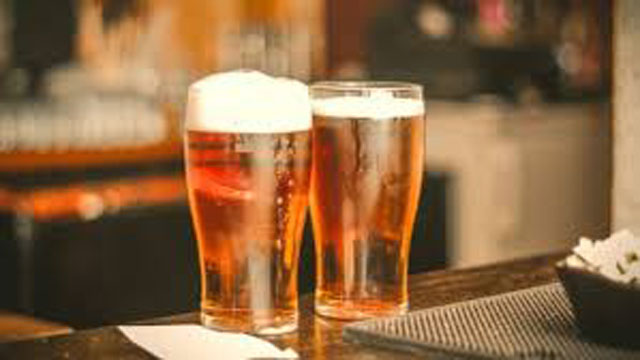
Once upon a time, I wrote an articleabout a time I was chastised for my tattoos while preaching at a small country church. I pondered then whether tattoos were seen as the ‘unforgivable sin’ in many Christian circles.
Well, that same day, after the service, somebody asked me what my plans were for the rest of the day. As it was summer, my wife answered that I would probably be watching the cricket and drinking a beer.
Wow. If I thought I was in trouble before, the admission that my pure Christian lips would go near something as utterly wicked as a beer sent them over the edge.
It seems that in many Christian circles, drinking alcohol is seen as another unforgivable sin. For example, I once spoke to somebody from an old church of mine who described a couple that she thought were Christians, but then lamented that she saw them at dinner once drinking beer. I know of a state denominational body in Australia that wanted all of its pastors to sign a contract promising to abstain from alcohol.
Therefore, my question is, ‘is this correct? Does Christianity require abstention from alcohol?’ Now before I move on I want to say that I understand that alcoholism is a destructive problem in Australia. Almost everybody knows somebody who has been negatively impacted by alcohol. So we need to be really wise when tackling the issue.
However, the purpose of this article is to see what Scripture, which for Protestant Christians is the normative source for everything we believe and do, has to say.
Biblical warnings
Well it turns out that the answer is ‘a lot’. There are many biblical verses speaking about alcohol, and often in a negative light. Proverbs chapter 20 verse 1 explains: “Wine is a mocker, strong drink a brawler, and whoever is intoxicated by it is not wise”. Drunkenness is repeatedly condemned in places like Isaiah chapter 5 verse 11, and Titus chapter 2 verse 3. Ephesians chapter 5 verse 18 famously commands:“do not get drunk with wine, for that is dissipation, but be filled by the Spirit.” (get NASB)
Paul even explains that elders and deacons (church leaders) must not be “addicted to wine or strong drink”(1 Timothy chapter 3 verse 3;Titus chapter 1 verse 7).
Those who champion abstention (teetotallers) will often point to such verses as proof that Christians must not drink alcohol at all.
However, you may have noticed that these particular passages do not warn against alcohol per se, but rather excessive consumption and drunkenness. So we need to keep digging.
Biblical exhortations
As we do dig around some more, we find that there are actually many positive references to alcohol in Scripture. For instance, Melchizedek (the priest of the Most High God and a type of Christ) gave wine to Abram (Genesis chapter 14 verse 18), while Psalm 104 verses 14-15 honours God as the creator of wine as a gift that “makes man’s heart glad”.
In the New Testament, Paul specifically instructs Timothy to drink wine, rather than just water (1 Timothy chapter 5 verse 23).Of course Jesus’ first miracle was turning water into wine at the wedding (John chapter 2 verses 1-10). Interestingly, the people that Jesus provides wine to had already “drunk freely” to the point that they usually can’t taste the difference between good and bad wine.
Jesus is even accused at one point of being a drunkard because He drinks wine (Luke chapter 7 verse 33-34), and Jesus drinks wine at the Last Supper, promising that one day we will drink wine with Him (Mark chapter 14 verses 23-25).
Finally, something that I think is often overlooked in this discussion, is that in Deuteronomy chapter 14 verse 24-26 God explains to His people that if they are not able to make it to the Tabernacle or Temple to bring their offering, they are able to exchange their offering for money. Then they are to “spend the money for whatever your heart desires: for oxen, or sheep, or wine, or strong drink, or whatever your heart desires; and there you shall eat in the presence of the Lord your God and rejoice…” They can spend their offering on wine or strong drink, and drink it to celebrate Him!
Just grape juice?
So maybe alcohol is not objectively wrong. That said, there are many today who claim that none of the above positive points are relevant because ancient wine wasn’t as strong, or wasn’t alcoholic at all (the term wine should be understood as grape juice in this view).
All I will say is if this is the case, then Scripture would not have to consistently warn against drunkenness, the guests at the wedding would not have “drunk freely” to the point of having dulled senses, people would not have confused the disciples for drunk at 0900 (Acts chapter 2 verse 15), and people would not have accused Jesus of being a drunkard. Clearly, alcohol had the same potential dangers to cause damage as today, yet it is extolled in the right context.
To me then, it appears that Scripture and the person of Jesus show that alcohol is not objectively evil. Believers have the freedom to enjoy God’s good creation, to His glory. It stops glorifying God and becomes problematic when it is abused, which Scripture unequivocally commands us against.
Beyond all this though, I think the issue of alcohol is a conscience issue. As Romans chapter 14 verse 21 explains, those that drink should not do it around others it offends or would create issues for (recovering alcoholics, for example). Likewise, teetotallers cannot enforce their abstention on other believer’s with a different conscience decision.
 Haydn Lea is an Ordained Minister, and is currently serving as an Air Force Chaplain in Adelaide. He is married to Shamsa Lea, and is the father of Amira and Ayla. He loves running, boxing and studying history and theology. Despite the chastisement, Haydn still doesn’t mind a beer or two on occasion.
Haydn Lea is an Ordained Minister, and is currently serving as an Air Force Chaplain in Adelaide. He is married to Shamsa Lea, and is the father of Amira and Ayla. He loves running, boxing and studying history and theology. Despite the chastisement, Haydn still doesn’t mind a beer or two on occasion.

Haydn Lea is an Ordained Minister, and is currently serving as an Air Force Chaplain in Adelaide. He is married to Shamsa Lea, is the father of Amira, and loves running, boxing and studying history and theology. Haydn describes himself as a five-point Calvinist, but he recognises that many faithful Christians disagree. Thankfully he isn’t a cage-stage Calvinist about it all.